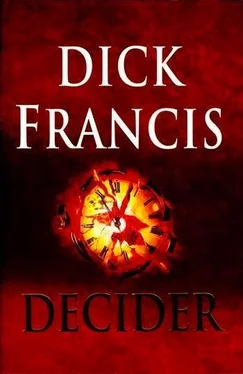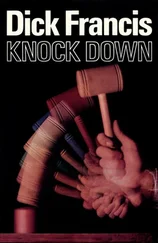The three pirate-ambushers had de-materialised from the oak. The scarlet bicycle flashed in the distance. My visitors looked back at the long dark bulk of the barn, and Roger finally came out with a question.
‘What an interesting house,’ he said civilly. ‘How did you find it?’
‘I built it. The interior, that is. Not the barn itself, of course. That’s old. A listed building. I had to negotiate to be allowed windows.’
They looked at the neat dark oblongs of glass set unobtrusively into the timber cladding, the only outward indication of the dwelling within.
‘You had a good architect,’ Roger commented.
‘Thank you.’
‘That’s another thing the Strattons are fighting over. Some of them want to tear down the stands and rebuild, and they’ve engaged an architect to draw up plans.’
His voice was thick with disgust.
I said curiously, ‘Surely new stands would be a good thing? Crowd comfort, and all that?’
‘Of course, new stands would be good!’ Irritation finally swamped him. ‘I implored the old man for years to rebuild. He always said, yes, one day, one day, but he never meant to, not in his lifetime, and now his son Conrad, the new Lord Stratton, he’s invited this dreadful man to design new stands, and he’s been striding about the place telling me we need this and we need that, and it’s all rubbish. He’s never designed stands of any sort before and he knows bugger all about racing.’
His genuine indignation interested me a lot more than a fight about shares.
‘Building the wrong stands would bankrupt everybody,’ I said thoughtfully.
Roger nodded. ‘They’ll have to borrow the money, and racing people are fickle. The punters stay away if you don’t get the bars right, and if the owners and trainers aren’t pampered and comfortable, the buggers will run their horses somewhere else. This lunatic of an architect looked totally blank when I asked him what he thought the crowds did between races. Look at the horses, he said. I ask you! And if it’s raining? Shelter and booze, I told him, that’s what brings in the customers. He told me I was old fashioned. And Stratton Park will get a horrendously expensive white elephant that the public will shun. And, like you said, the place will go bust.’
‘Only if the sell-now or sell-later factions don’t get their way.’
‘But we need new stands,’ Roger insisted. ‘We need good new stands.’ He paused. ‘Who designed your house? Perhaps we need someone like him .’
‘He’s never designed any stands. Only houses... and pubs.’
‘Pubs,’ Roger pounced on it. ‘At least he’d understand the importance of good bars.’
I smiled. ‘I’m sure he would. But you need big-building specialists. Engineers. Your own input. A team.’
‘Tell that to Conrad.’ He shrugged dejectedly and slid behind his steering wheel, winding down the window and peering out for one more question. ‘Could I possibly ask you to let me know if or when the Stratton family contact you? I probably shouldn’t trouble you, but I care about the racecourse, you see. I know the old man believed it would carry on as before, and he wanted it that way, and perhaps there’s something I can do, but I don’t know what , do you see.’
He reached into his jacket again and produced a business card. I took it and nodded, making no promise one way or another, but he took the acknowledgement as assent.
‘Thank you very much,’ he said.
Oliver Wells sat impassively beside him, showing his certainty that their mission had been, as he’d all along expected, unproductive. He still failed to raise guilt in me. Everything I knew of the Strattons urged me strongly to stay away from them in every way I could.
Roger Gardner gave me a sad farewell and drove off, and I went back into my house hoping I wouldn’t see him again.
‘Who were those people?’ Amanda said. ‘What did they want?’
The fair-haired woman, my wife, lay at the far side of our seven foot square bed, emphasising as usual the distance between us.
‘They wanted a white knight act on Stratton Park racecourse.’
She worked it out. ‘A rescue job? You? Those old shares of yours? I hope you said no.’
‘I said no.’
‘Is that why you’re lying there wide awake in the moonlight, staring at the canopy?’
The pleated silk canopy roofed our great four-poster like a mediaeval sleeping tent, the only way to achieve privacy in those days before separate bedrooms. The theatrical glamour of the tester, the tassels and the bed’s cosy promise beguiled friends: only Amanda and I understood the significance of its size. It had taken me two days of carpentry and stitching to construct, and it was understood by both of us to be a manifestation of a hard-won compromise. We would live in the same house, and also in the same bed, but apart.
‘The boys break up from school this week,’ Amanda said.
‘Do they?’
‘You said you’d take them somewhere for Easter.’
‘Did I?’
‘You know you did.’
I’d said it to de-fuse an argument. Never make rash promises, I told myself. An incurable failing.
‘I’ll think of something,’ I said.
‘And about this house...’
‘If you like it, we’ll stay here,’ I said.
‘Lee!’ It briefly silenced her. I knew she had a thousand persuasions ready: the scattered hints and sighs had been unmistakable for weeks, ever since the gravel had been laid in the drive and the building inspector had called for the last time. The house was freehold, finished and ready for sale, and we needed the money. Half my working capital lay cemented into its walls.
‘The boys need a more settled existence,’ Amanda said, not wanting to waste her reasons.
‘Yes.’
‘It’s not fair to keep dragging them from school to school.’
‘No.’
‘They worry about leaving here.’
‘Tell them not to.’
‘I can’t believe it! Can we afford it? I thought you’d say you couldn’t afford it. What about the mansion near Oxford, with the tree growing in the drawing room?’
‘With luck I’ll get planning permission this week.’
‘But we’re not going there, are we?’ Despite my assurance, her anxiety rose sharply.
‘I’ll go there,’ I said. ‘You and the boys will stay here for as long as you want. For years. I’ll commute.’
‘You promise .’
‘Yes.’
‘No more mud ? No more mess ? No more tarpaulins for roofs and brick dust in the cornflakes?’
‘No.’
‘What made you decide?’
The mechanics of decision, I thought, were mysterious. I could have said it was indeed because it was time to settle down for the children’s sake, that the eldest had reached the examination time zone and needed continuity in teaching. I could have said that this area, the smiling countryside on the Surrey-Sussex border, was as wholesome as anywhere nowadays. I could have made the decision sound eminently logical.
Instead, I knew in my private mind that the decider had been the old oak. It had appealed to me powerfully, to the inner boy who had been brought up in London traffic, surrounded by landscapes of stone.
I’d seen the oak first a year earlier, fuzzy then as now with the promise of leaf. Mature, perfect, its boughs invited climbers, and as I’d gone there alone I climbed it without embarrassment, sitting at home in its ancient embrace, looking at the rotting great eyesore of a barn that the hard-up landowner had been forbidden to demolish. A historic tithe barn! A local landmark! It would have to stay there until it actually fell down.
A lot of crap, I’d thought, descending from the tree and walking into the ruin through a creaking gap doing duty as a doorway. History-worship gone mad.
Читать дальше




